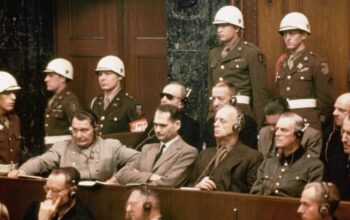Some individuals are remembered for their accomplishments and contributions, while others for their associations and controversies. Donald Barr, the father of former U.S. Attorney General William Barr, falls into both categories. Beyond being a prominent educator and administrator, Barr’s name has been intertwined with the infamous Jeffrey Epstein scandal. But his life is more than just this scandalous connection. In this comprehensive article, we’ll look into the life of Donald Barr, his career in academia, his science fiction novel “Space Relations: A Slightly Gothic Interplanetary Tale,” and the disturbing themes explored in that book.
Early Life and Academic Career
Donald Barr was born on August 8, 1921, in Manhattan, New York City. He came from a modest background but demonstrated early academic promise. Barr attended the prestigious Columbia University, where he earned a bachelor’s degree in mathematics and worked his way through college as a waiter.
After completing his undergraduate studies, Barr served in the United States Army during World War II.
Upon returning from the war, Barr pursued higher education with a passion. He completed a master’s degree in English literature from Columbia University and later obtained a Ph.D. in government from Columbia’s School of International and Public Affairs. This academic journey laid the foundation for a lifelong career in academia.
Barr’s academic career took off as he began teaching at Columbia University. He quickly gained recognition for his expertise in government and served as an assistant professor. He then moved on to Princeton University, where he continued to teach political science and contribute to academic discourse.
Stint at the Office of Strategic Services (OSS)
While Barr’s academic career was thriving, his dedication to public service remained unwavering. In the early 1950s, he joined the newly established Office of Strategic Services (OSS), the precursor to the Central Intelligence Agency (CIA). Barr’s experience in government and his knowledge of international affairs made him an invaluable asset to the agency during the Cold War era.
During his time at the OSS, Barr’s work was shrouded in secrecy, as was typical of intelligence agencies. His precise role and contributions are not fully disclosed in the public domain. However, it is known that his work at the OSS involved intelligence analysis and strategy development, contributing to the nation’s efforts in combating the spread of communism.
Academic Leadership and Ethical Education
After his service with the OSS, Barr returned to academia with a newfound sense of purpose. He took up positions of academic leadership and administration, serving as the Dean of the Faculty of Arts and Sciences at Columbia University from 1968 to 1974.
One of Barr’s notable achievements during his tenure as dean was his commitment to ethical education. He played a pivotal role in shaping the university’s curriculum to include courses on ethics and moral values. Barr firmly believed that education should not only impart knowledge but also instill a strong sense of ethics and moral responsibility in students.
Space Relations: A Slightly Gothic Interplanetary Tale
Donald Barr was not only an academic and administrator but also an accomplished author. In 1973, he published a science fiction novel titled “Space Relations: A Slightly Gothic Interplanetary Tale.” This work of fiction took readers on a journey to a distant planet, exploring themes of power, oppression, and rebellion.
The novel’s plot revolves around the planet Kossar, which is ruled by an oligarchic elite. The oligarchs, in their pursuit of power and pleasure, engage in heinous practices, including child sex slavery. Barr’s narrative takes a dystopian turn as the protagonist, John Craig, finds himself entangled in this nightmarish society. The story unfolds as Craig becomes embroiled in a rebellion against the oppressive regime.
While the novel is undoubtedly a work of science fiction, it delves into dark and disturbing themes, including the abuse of power and the exploitation of the vulnerable. It’s worth noting that the book’s portrayal of child sex slavery has raised eyebrows and sparked discussions about the intent and message behind Barr’s writing.
Controversy and Jeffrey Epstein
Donald Barr’s life would take a darker turn in the context of the infamous Jeffrey Epstein scandal. Jeffrey Epstein, a financier and convicted sex offender, would later become a name synonymous with sexual exploitation and abuse.
Barr’s connection to Epstein lies in his role as the headmaster of the Dalton School in New York City from 1964 to 1974. The Dalton School was a prestigious private institution that catered to the educational needs of affluent families. It was during Barr’s tenure as headmaster that he hired Epstein as a math teacher despite the fact that Epstein had failed to complete his degree and was only 21 years old at the time.
Epstein’s association with Barr’s Dalton School is not inherently controversial. However, it is essential to examine the context of Epstein’s later criminal activities. In 2008, Epstein was convicted of soliciting prostitution from a minor and served a relatively light sentence under a controversial plea deal.
The controversy surrounding Barr’s connection to Epstein centers on whether Barr was aware of Epstein’s actions during his time at Dalton. To date, there is no concrete evidence to suggest that Barr had any knowledge of Epstein’s illicit activities or that he played a role in facilitating them.
Closing Thoughts
Donald Barr’s life was marked by a commitment to education, public service, and ethical values. He rose from humble beginnings to become an influential academic and administrator, leaving a lasting impact on the institutions he served. His science fiction novel, “Space Relations: A Slightly Gothic Interplanetary Tale,” remains a subject of intrigue and debate due to its disturbing themes.
However, Barr’s legacy is also marred by his association with Jeffrey Epstein, a shadow that continues to cast doubt and suspicion over his tenure as headmaster of the Dalton School. While the exact nature of Barr’s knowledge regarding Epstein’s activities remains uncertain, it serves as a cautionary tale about the complexities of human connections and the unpredictability of legacies.
In the end, Donald Barr’s life is a story of ambition, service, and the enduring questions surrounding his associations. As history continues to unravel the layers of his life, his name will remain etched in both the annals of academia and the pages of controversy.



